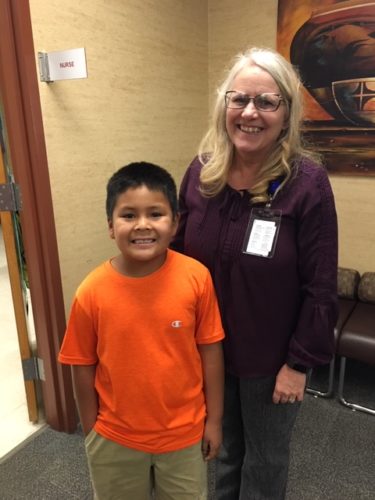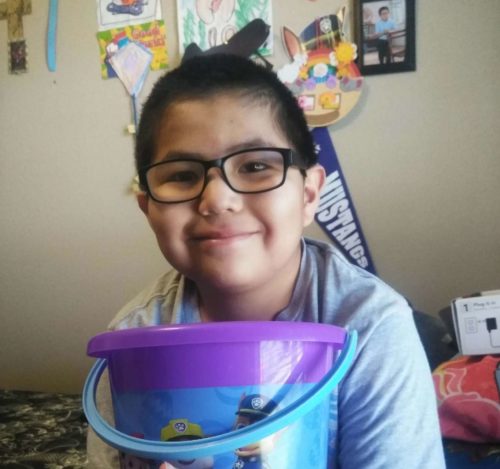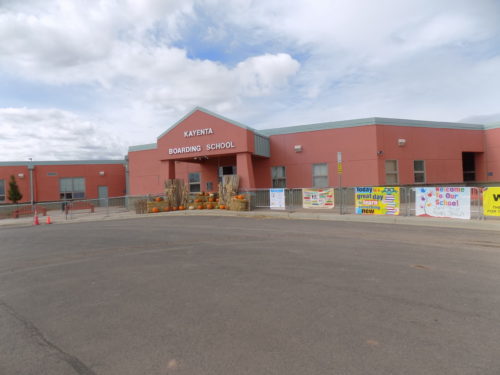We are happy to share with you our Spring 2021 Newsletter, highlighting our work around the world thanks to our sponsors and donors and their generosity and dedication in helping children in need. Enjoy!
Tablets Are Bringing Education to Children Around the World
Many children in our sponsorship program are experiencing exceptional difficulties during the worldwide COVID-19 pandemic, as schools have had to shift to virtual learning. These adjustments have been hard on parents, teachers and children — especially for those students who don’t have the technology they need at home to keep up with their course work.
We are happy to share with you our Spring 2021 Newsletter, highlighting our work around the world thanks to our sponsors and donors and their generosity and dedication in helping children in need. Enjoy!
Thankfully, because of our amazing donors, Children Incorporated has been able to provide tablets to children in our program in Latin America, India, and in the United States over the last few months so that children can continue learning until schools are back to in-person learning in the near future. These tablets will allow students to keep up with their studies and do not have to be returned when classes resume so children can keep learning at home after the pandemic as well!
Bringing Joy to Children During the Holiday Season
Our sponsors and donors are often the only reason children in our program receive holiday gifts, and for that, we are incredibly grateful — especially after an exceptionally difficult year for so many families.
On behalf of all our volunteer coordinators around the world, we would like to share a message from Sandy at Beaver Creek Elementary in Kentucky to express our gratitude for the holiday gifts you provided:
“Thank you for all the support you give our children. You are our backbone. We couldn’t survive without Children Incorporated. Merry Christmas to all Children Incorporated staff and sponsors!”
Our Warm Clothing Fund Brings Smiles to Children in Need
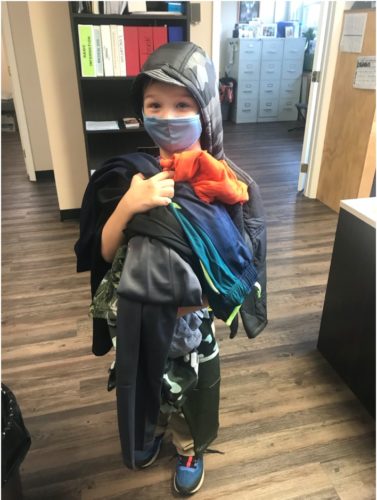
Brain poses for the camera with this new clothes.
Every year, your donations to our Warm Clothing Fund do more than just keep children properly clothed — it also brings immense joy to children who otherwise might never get new winter clothes.
Our volunteer coordinator, Monica, at Gouge Elementary School in North Carolina wrote to us about Brian*, after she provided him with warm clothes, thanks to his sponsor:
“I showed Brian the new clothes I bought him, and he is loving it. He said, ‘I just love clothes!’ And I took the picture in that moment. The mask is hiding his laughter. We both got tickled because he got so much clothes, he couldn’t hold all of it. The socks are in his book bag.
This was definitely the highlight of my week. Thanks to Children Incorporated sponsors for all you do, and for letting me be a part of this!”
*Name changed to protect the child.
An Interview with Board Member, Liz Collins
Our President and Chief Executive Officer, Ron Carter, recently sat down with our Board Chair, Liz Collins, to discuss her long and valuable relationship with Children Incorporated.
RON: Liz, you first became involved with Children Incorporated in 2003 when you accepted a job as a sponsorship coordinator. You later served as Director of Marketing and Development. What are your recollections of your time as an employee of Children Incorporated?
I loved being able to share all of the amazing work that went on in our programs with our donors. As a result of their giving and the tireless efforts of our volunteer coordinators, we changed a lot of lives.
Liz Collins, Board Chair
LIZ: I loved being able to share all of the amazing work that went on in our programs with our donors. As a result of their giving and the tireless efforts of our volunteer coordinators, we changed a lot of lives.
RON: Do you have any special memories of that time?
LIZ: I do. The stories of the children who graduated from high school and went on to college are special to me. I recall one particular story of how we were able to send funds to have a child’s driveway paved so that he could use his wheelchair to get to the bus. Before that, his brother had to carry him down the driveway to the bus each day. I also think about the incredible artwork of Roberto Andrade, one of the children in Latin America who benefitted from our program. There are so many more wonderful memories!
RON: You left Children Incorporated in 2010, shortly after your son, Noah, was born, but I asked you to return to Children Incorporated as Board Member at the start of 2015, and you willingly agreed. Just a few months after you joined, Steve Holton, our then chair, was forced to resign due to health reasons, and you were selected as Board Chair. In your wildest dreams, did you ever see that coming?
LIZ: No! I was truly taken by surprise with the sudden turn of events, but honored and humbled to be able to serve the organization in a new way.
RON: As Board Chair, what are your impressions of Children Incorporated? What are you most proud of? What is it about Children Incorporated that you most value?
LIZ: Children Incorporated might be among the smaller sponsorship organizations, but it is by far the most personable. That’s what I love, and I truly believe our donors and volunteer coordinators value that attribute as well. We’re transparent in our funding, and we’re extremely conscientious about our overhead so that much more of every dollar raised can go to the children, families, and communities we serve.
RON: I agree that our personality as an organization, as well as our transparency, are the keys to our continued success. But I also have to say that we have a wonderful network of volunteer coordinators, and our small but loyal staff really is incredible.
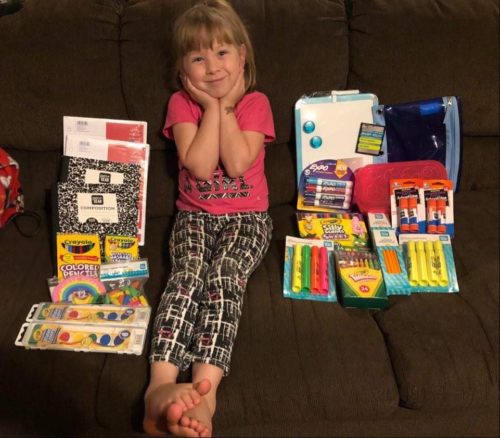
Emily was very excited to receive school supplies thanks to her sponsor.
LIZ: Yes, I agree completely. That old saying “It takes a village” really applies. That is how I see Children Incorporated. The staff, our donors, and the volunteer coordinators, all working together, make it all happen. And, it’s a village I’m very proud to be a part of and to serve in.
Still in Need of Ordinary School Supplies
School closures have meant big changes for families and children in our program, but despite the adjustments that the pandemic required, students still need the most basic items that Children Incorporated has always provided for them.
While many of our sponsored children are learning remotely at home, either partially or wholly, they still need ordinary school supplies, especially the younger ones. Emily*, received a bundle of new supplies at home thanks to her sponsor and promptly wrote to him to say that she loved everything — especially the dry erase board and matching magnets. From her photos, you can see that Emily’s sponsor has made her incredibly happy as she adjusts to home learning!
*Name changed to protect the child.
A Special Thank You to Our Partner, the Jeunesse Kids Foundation
In January 2021, we were approached by the Jeunesse Kids Foundation to participate in a fundraiser they were hosting virtually. Jeunesse Kids is dedicated to creating a positive impact in the lives of children worldwide, and the foundation is funded and supported by a vast community of caring individuals who are passionate about building a better tomorrow for young people in underprivileged communities around the world — which very closely aligns with Children Incorporated’s mission and vision.
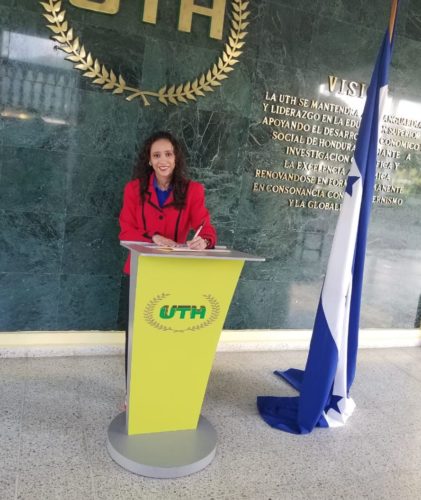
We are very proud of you, Kris!
Thanks to the efforts of all of the Juenesse Family, their fundraiser raised over $102,000 for Children Incorporated from donors around the world over the course of a weekend which will go towards purchasing tablets for virtual education children in Peru, Argentina, the Philippines, Kentucky and New Mexico, repairing a greenhouse at the St. Michaels Special Education School in Arizona, and towards expanding on skills training programs at the Montero School in Bolivia. We are incredibly grateful for their support!
From Sponsored Child to Attorney: Our Higher Education Fund at Work
We want to send our congratulations to Kris in Honduras for receiving her University Degree at the end of 2020. Kris has been in our sponsorship program since 1999. Thanks to her sponsor and our Higher Education Fund, she was able to attend school over the last twenty years and now has graduated as an attorney. We are very proud of you, Kris!
A New Roof at the Dandora Center in Kenya
While students were out of school for remote learning, we were able to continue to support our projects thanks to donations to our Hope In Action Fund so administrators could repair buildings in anticipation of the return of students in the near future.
At our affiliated project, the Dandora Center in Nairobi, Kenya, a new roof replaced an old worn one which will protect the children from poor weather and heat when they are back in classrooms.
READ THE FULL NEWSLETTER

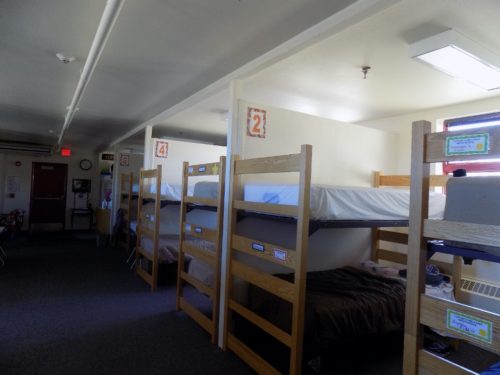



 Beyond just encouraging reading among students, AR also provides:
Beyond just encouraging reading among students, AR also provides: